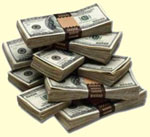 Reuters: Iran may seek payment for its oil exports to Europe in UAE dirhams rather than euros because tougher EU sanctions could block Iranian transactions in the single European currency, an Iranian official said on Sunday.
Reuters: Iran may seek payment for its oil exports to Europe in UAE dirhams rather than euros because tougher EU sanctions could block Iranian transactions in the single European currency, an Iranian official said on Sunday.
By Amena Bakr
 DUBAI, July 18 (Reuters) – Iran may seek payment for its oil exports to Europe in UAE dirhams rather than euros because tougher EU sanctions could block Iranian transactions in the single European currency, an Iranian official said on Sunday.
DUBAI, July 18 (Reuters) – Iran may seek payment for its oil exports to Europe in UAE dirhams rather than euros because tougher EU sanctions could block Iranian transactions in the single European currency, an Iranian official said on Sunday.
But the United Arab Emirates, a U.S. ally and major oil exporter whose ties with Iran are already strained, is likely to resist such a change given its wish to avoid being sucked deeper into the dispute over Iran’s nuclear ambitions.
“This matter of changing over to UAE dirham is under discussion among Iranian officials at the moment but has not been implemented yet,” the official from the Iranian Embassy in the United Arab Emirates told Reuters on condition of anonymity.
“The weak position of the euro and the dollar, in addition to the fear of blocking transactions if these currencies are used in trade, is what led Iran to consider the switch.”
The dollar is the standard currency for oil trade, but Iran had shifted to the euro for European deals in response to many years of U.S. sanctions against the Islamic Republic.
Last month Europe also toughened its sanctions against Iran in a stepped-up international effort to make Tehran suspend a nuclear programme which the West suspects is secretly designed to develop atomic bombs. Iran says it seeks only civilian energy from its uranium enrichment process.
The Iranian official said talks were internal at this stage, and that Tehran had not yet broached the subject with Abu Dhabi.
UAE officials at the Central Bank, economy ministry, foreign ministry and finance ministry had no immediate comment.
Oil transactions can in theory be carried out in whatever currency the parties involved decide.
Industry sources have said Iran and China, one of Iran’s main trading partners, were also discussing possible payments in Chinese yuan.
LACK OF LOGIC
In commercial terms, a shift to dirhams would be illogical, some analysts said, since the currency is pegged to the dollar and has limited use on international markets.
“It does not make much sense. It’s not an international trading currency in the way the dollar is. What transaction can you do in dirhams? You have to convert it back into dollars,” said one analyst who asked not to be named.
A switch could still be a way of taking a swipe at the United Arab Emirates, whose relations with Iran have deteriorated and which has told its financial institutions to freeze the accounts of dozens of Iranian firms.
Thousands of Iranian companies and businessmen operate in Dubai, many of them involved in multi-billion-dollar re-export trade with the Islamic Republic across the Gulf.
“The parent country, be it the UAE or China, will find themselves in an interesting situation if the Iranians begin to hold large amounts of their currency,” said John Sfakianakis of Banque Saudi Fransi in Riyadh.
“The UAE is trying to tighten restrictions on trade with Iran and if the dirham is used as the main currency, Iran selling its oil in it would place an interesting dimension to the relationship.”
The national currency is a matter of pride in the United Arab Emirates. “They were very careful not to be part of the GCC (Gulf Cooperation Council) currency because they are keen to protect their own currency,” said Mustafa Alani, analyst at Gulf Research Centre in Dubai.
“They are very sensitive to their currency and they think that the dirham is a national currency and they are not ready either to give it away or let it be used by other countries.”
Alani doubted that Iran would be able to use dirhams for oil trade unless the UAE gave its consent, and said he thought Iran was just trying at this time to sound out reaction. (Additional reporting by Barbara Lewis, Raissa Kasolowsky and Cynthia Johnston in Dubai, Stanley Carvalho in Abu Dhabi and Chen Aizhu in Beijing; Editing by Mark Heinrich)


